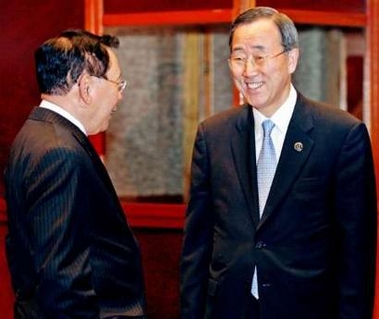|
India, South Korea strengthen trade ties with Southeast Asia
(AP)
Updated: 2005-12-10 10:40
India is heading for closer trade ties with Southeast Asia, as is South
Korea, though its efforts have been complicated by a dispute over rice. Japan
says its free trade deal with the region is faltering.
Notwithstanding the mixed results, the free trade negotiations underline the
desire of the 10-member Association of Southeast Asian Nations _ with a combined
economy of more than US$1.4 trillion (euro1.18 billion) _ to deepen trade ties
with some of Asia's largest economies.
The negotiations also show that some Asian governments are just as sensitive
to protecting their farmers as their European counterparts, a key stumbling
block in advancing World Trade Organization talks.
Regional economic integration will be a key theme of the coming week's
meetings in Kuala Lumpur between ASEAN leaders and counterparts from Japan,
China, South Korea and India.

South Korea's Foreign Minister Ban Ki-moon (R)
talks to his Philippines' counterpart Alberto Romulo before the start of
the ASEAN + Korea foreign ministers meeting at Kuala Lumpur Convention
Center, ahead of next week's 11th ASEAN Summit and the inaugural of the
East Asia Summit, in Kuala Lumpur December 9, 2005.
[Reuters] | Those talks will be followed by the
inaugural East Asia Summit, which aims to create a region-wide economic
community, including Australia and New Zealand.
South Korea on Friday signed an accord on free trade in goods with nine ASEAN
members as a 10th member, Thailand, stayed away, objecting to Seoul's refusal to
lower tariffs on rice. But Thailand, the world's top exporter, said it may
negotiate its entry into the deal later.
"Once you take rice out of the list, I think both Thailand and Korea have to
spend time to discuss further to find a rice solution so we can agree," Thai
Commerce Minister Somkid Jatusripitak said.
"We decided to defer ... the time has been too short," he said.
South Korean rice farmers are an important political lobby who have protested
violently against market-opening deals reached earlier with China, the U.S. and
others.
Also Friday, Japan's minister of economy, trade and industry Toshihiro Nikai,
acknowledged that free trade negotiations with ASEAN had failed but proposed new
talks in a more casual setting, which his hosts accepted.
"We have to produce results," said Nikai, adding that the two rounds of free
trade talks that began in April were faltering. "We would like ASEAN nations to
see Japan as a trustworthy nation."
Japan has been nervous about falling behind China and South Korea on free
trade agreements with ASEAN. China signed a trade accord with Southeast Asia
last year.
Japan and ASEAN are at odds over tariff reductions, and some ASEAN members
had complained that Japan was pushing separate deals with member nations that
confused the overall talks, Japanese officials said.
Japan has free trade agreements with only Singapore and Mexico so far,
although it's set to sign a pact with Malaysia next week during the ASEAN and
East Asia Summit meetings.
Japan is Malaysia's third-largest trading partner and the countries say they
expect it to significantly boost their US$30 billion (euro25.5 billion) annual
trade, allowing Japan's automakers, banks and consumer-goods makers greater
access to the Malaysian market.
Meanwhile, India's pact with Southeast Asia, while still under negotiations,
is expected to come into force by 2007.
"The negotiation is on the verge of completion. We have passed many, many
milestones," Indian Commerce Minister Kamal Nath told reporters. The deal is
expected to increase trade between India and ASEAN by 30 percent annually, he
said.
ASEAN-India annual trade jumped 40.8 percent last year over 2003, from
US$12.5 billion (euro10.6 billion) to US$17.6 billion (euro14.96 billion). That
marked its biggest-ever annual rise, it's still tiny compared with ASEAN's
US$136 billion (euro115.61 billion) in annual trade with the United
States.
|